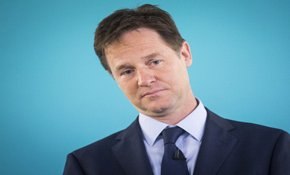John Humphrys asks: what can the Liberal Democrats do to recover?
No party in Britain suffered greater humiliation in last week’s elections than the Liberal Democrats. The dismal results seem to portend annihilation at next year’s general election. But what looks like an attempted coup to get rid of the leader, Nick Clegg, in order to give the party some hope of salvation, has already blown up spectacularly. So what, if anything, does the party need to do to save itself?
The election results were even worse for the LibDems than the most pessimistic had feared. In the local elections the party could muster only 13% of the vote, losing a large proportion of its councillors in the process. Since the party went into coalition with the Tories in 2010 it has lost almost half of its councillors.
In the European election it did even worse. With only 7% of voters backing it, the party slumped to fifth in the overall contest and retained only one of its seats in the European Parliament. Public backing, as measured by opinion polls, is now barely half of the 23% support it enjoyed at the last election.
In such circumstances leaders carry the can. So it is not surprising that in the wake of these results those in the party who have never much liked Nick Clegg got their guns out. Chief among these was the senior LibDem peer, Lord Oakeshott. Matthew Oakeshott’s political background is in the Labour Party and then the SDP, which he helped to found. He was a backer of Chris Huhne against Nick Clegg in the last leadership contest and has been a close ally of the Business Secretary, Vince Cable, another veteran of the Labour/SDP stable.
Lord Oakeshott paid for a set of private opinion polls conducted in key LibDem-held parliamentary seats, including Sheffield Hallam, the constituency of Mr Clegg. He wanted to find out what chance the party had of holding on to these seats if Mr Clegg remained as leader and whether the prospects would improve if Mr Cable replaced him. It emerged that a change of leader might indeed help a bit. The results somehow found their way on to the front page of the Guardian.
It would seem that Lord Oakeshott hoped that the information from these polls would provide ammunition for others in the party who, like him, were sure there needed to be a new leader. But the ammunition blew up in his face. A chorus of protest erupted within the leadership of the party. He was accused of behaving in a ‘reprehensible’ manner, even of being ‘malicious’. Vince Cable himself said his behaviour was ‘totally inexcusable and unacceptable’.
On Wednesday, Lord Oakeshott resigned from the party. But he used the occasion to fire off a few, final salvos. He said: ‘I am sure the party is heading for disaster if it keeps Nick Clegg.’ He accused Mr Clegg of making the party ‘a split-the-difference party with no roots, no principles and no values’.
He also went on to claim that his ‘longstanding friend’, Mr Cable, had known all about his polling activity. From far away in China, the Business Secretary acknowledged that he knew Lord Oakeshott had been commissioning some polling but firmly denied that he knew anything about undercover polls being carried out in his leader’s own constituency. His colleagues within the top LibDem leadership have fully accepted his claims of innocence.
For the time being, then, Mr Clegg’s leadership seems to have been strengthened by the failure of this apparent coup. It will take either 29 of his MPs to withdraw their support for him, or for 75 constituency parties to call for his resignation, for him to be dislodged and neither seems likely at the moment.
But if a change of leader seems off the agenda, what other options do the LibDems have if they want to avoid electoral oblivion?
It seems pretty obvious that the root cause of the loss of half the party’s support at the last election is the decision to join a coalition with the Tories. As the veteran Conservative cabinet minister, Ken Clarke, has pointed out a large part of the LibDem vote at the last election came from voters to the left of the Labour Party. Since the LibDems have ended up in a government of the centre right, it’s hardly surprising those voters are now looking elsewhere.
In order to win them back, the obvious thing to do is for the LibDems to leave the coalition during this last year before the general election so that they can campaign independently and give themselves time to distinguish themselves from their current Tory partners. No doubt this strategy would, indeed, require a new leader.
But many say it would be a mistake because there was never any serious alternative strategy in 2010 but to join the Conservatives in coalition: a Labour/LibDem coalition was never on the cards. So, since the government of the country had to carry on, especially in the dire economic circumstances of the time, it was the duty of the party to sign up to coalition. Furthermore, since the LibDems have long advocated coalition government as being better for the country, they can hardly walk away from coalition now, just because things are looking bleak electorally. As for fighting the next election, the manifesto for the next parliament will give the party the opportunity to show voters how different it is from the Tory Party, they say.
This, however, fails to reassure those who think something radical needs to be done in order to avoid oblivion: a three-week election campaign simply won’t give the party long enough to emerge from under the Tory shadow.
There is, though, an argument which says: ‘Don’t Panic’ or, in the words of the tee-shirt: ‘Keep Calm and Carry On’. Behind this case lies the observation that although UKIP may have been top of the polls in last week’s elections, and the LibDems down the bottom, it will be far harder for UKIP to win its first seats at Westminster in next year’s general election, than it will be for the LibDems to hold on to most of their existing seats. That’s not only because the first-past-the-post system makes it difficult for new parties to break through, but also because the LibDems have an excellent track record of holding on to seats where their MP has dug in. That was very much shown to be the case during this parliament when the party held on at a by-election in Eastleigh, even in the circumstances where the sitting LibDem MP, Chris Huhne, had had to resign as he was heading off to prison. Since all the indications are that the next election will be a tight one, if the LibDems can hold on to forty or so seats (which seems perfectly possible), they could once again hold the balance of power.
Seen in this light, the LibDems, far from heading to ‘disaster’ under Nick Clegg, have a reasonable prospect of remaining in coalition government. And if the numbers turned out to mean that that was a Tory-led government again, no doubt Mr Clegg would go on being Deputy Prime Minister.
For those in the party who share Lord Oakeshott’s view of things, that would just confirm that the party had become a ‘split-the-difference’ party. But others would say that that is simply the inevitable consequence of parties sharing power in government. Liberal Democrats are supposed to believe in that, so they should just get used to it.
But many will refuse. They see the party as a party of radical opposition not simply as the first port of call for the big parties when they need to shore up a government. And many will remember what happened to the old Liberal Party when it got into bed with the Tories in coalitions at various times in the last hundred and fifty years. The party got submerged by the more powerful Tories, with many of the leading Liberals actually turning into official Conservatives. That, for them, would be the worst fate of all.
So what, if anything, should the LibDems now do?









